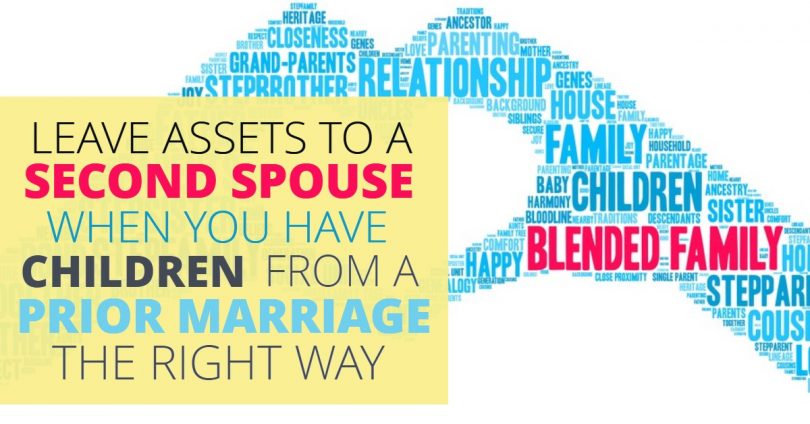How do you ensure that both your new spouse and your children from your first marriage receive an inheritance?
In this day and age, it is not uncommon to remarry after a divorce or the death of a spouse. Often in these remarriages, one or both spouses have children from a prior marriage. These blended families can pose some challenging estate planning issues for the newlyweds. If you die before your new spouse, how do you ensure that both your new spouse and your children from your first marriage receive an inheritance? Who gets the house – your new spouse or your children? How will your new spouse get by financially if you choose to provide an immediate inheritance for your children?
In a perfect world, you could leave everything outright to your new spouse and trust your new spouse to eventually leave the balance to your children through a Will. Unfortunately, your spouse may decide for various possible reasons to disinherit the step-children by simply changing his or her Will. Don’t think it could happen? How about this scenario?
Bob and Betty are a married couple with three kids. Betty tragically passes away at a young age. Eventually, Bob meets and marries Jane. Bob and Jane set up reciprocal Wills leaving all of their assets to each other otherwise to Bob’s children. Bob dies shortly after in a car accident, and Jane inherits all of Bob’s property.
A few years later, Jane marries James who has two children of his own. James moves into the house that Jane inherited from Bob. Bob’s children do not get along with the James. James convinces Jane to revise her will to leave everything to James and his two children upon her death. James outlives Jane and inherits all of the assets Bob left to Jane.
Do you think Bob ever envisioned James inheriting his assets? While Jane is taken care of in this scenario, Bob’s children were unintentionally disinherited by Bob.
GOT QUESTIONS… JUST CLICK HERE!There are several other ways this scenario could play out with similar results. Jane could exhaust all of the assets or gift the assets outside of Bob’s family. Jane could have creditor, bankruptcy or divorce problems and lose all the assets. Jane may have a falling out with Bob’s children and revise her estate plan to leave them nothing.
The point is Bob’s simple reciprocal Will plan with Jane is fraught with risks that could cause Bob to unintentionally disinherit his children. The good news is there is an easy solution. Bob could have his assets pass to a revocable trust agreement that is funded either during his life, through his Will, or through beneficiary designations, or a combination of these methods. Bob can amend or revoke the Trust at any time so he is free to change his mind. Upon Bob’s death, the trust would become irrevocable and continue for the benefit of Jane and the benefit of Bob’s children. The Trustee could invest the assets to make them income producing, and pay all of the income to Jane for the rest of her lifetime while preserving the principal for Bob’s children. Upon Jane’s death, the remaining principal of the trust would go to Bob’s children either outright or in further trust. If Bob wants Jane to have access to the trust principal, Bob could name an independent trustee who has the power to pay some of the principal to Jane if she needs the principal.
Some benefits of Bob using a trust in this situation include:
- Adding spendthrift protection
- Bob maintaining post-death control over his assets, and
- Bob ensuring he provides for both Jane and his children.
Spendthrift protection refers to trust language that prevents the trustee from paying any creditors of the beneficiaries. Thus, if Jane or a child have creditor issues or get divorced, the assets will remain protected inside the trust.
Bob maintains control over his assets because his trust becomes irrevocable at his death. Jane cannot change the plan to disinherit Bob’s children. If Bob sees no need to provide for Jane if she remarries, the trust could provide that Jane’s interest in the trust ends upon her remarriage.
Bob can name a trustee or co-trustee to serve with Jane to manage and preserve the assets for the mutual benefit of Jane and for Bob’s children.
There are many options available under a Revocable Trust to suit your individual needs and goals. The central point is, by proper planning, you can maintain control over your assets to prevent disinheritance of your children while still providing for your second spouse.
Article references:
www.trustsestateselderlawct.com







